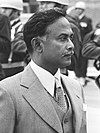Portal:Bangladesh/Selected biography/9

Ziaur Rahman (Bengali: জিয়াউর রহমান Ziaur Rôhman) (January 19, 1936 – May 30, 1981) was the President of Bangladesh and the founder of the Bangladesh Nationalist Party. Popularly called Zia, he is also sometimes referred to as a Shaheed (Martyr). His widow Begum Khaleda Zia has served as Prime Minister of Bangladesh three times.
An officer in the Pakistan Army, Zia's unit captured the Kalurghat radio station at the onset of the Bangladesh Liberation War and declared the independence of Bangladesh on behalf of Sheikh Mujibur Rahman. Recognised as a war hero, he was honoured with the Bir Uttom in 1972. A high-ranking officer in the Bangladesh Army, Zia was appointed chief of army staff following the assassination of Sheikh Mujibur Rahman in 1975. Although briefly overthrown in a counter-coup, Zia returned to power in a military coup organised by Colonel Abu Taher.
Declaring himself president in 1977, Zia won a referendum held in 1978. Founding the Bangladesh Nationalist Party, Zia won widespread popular support for stabilising the nation and leading it in a new direction. A right-wing politician, Zia established free-market policies in a 19-point programme of industrialisation and development. He adopted policies bringing the government increasingly under Islam, which he included in the national constitution. Zia controversially pardoned the assassins of Sheikh Mujib by signing the Indemnity Act and rehabilitated individuals who had supported the Pakistan Army. A popular yet controversial leader, Zia was assassinated in 1981 in an abortive military coup. (more...)
